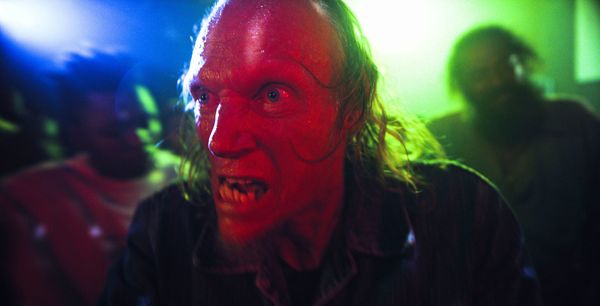 |
| Fried Barry Photo: Courtesy of Fantasia |
The story of an alien borrowing the body of an abusive man and taking it on a joyride through Cape Town, Fried Barry is one of those films that will burn itself into your brain, leaving an indelible impression. It’s been an equally wild experience for director Ryan Kruger, who still seems overwhelmed by the response it has been getting on the festival circuit. A few days before its scheduled screening as part of Grimmfest, we took the time to talk about his experiences, starting with the short with the same title which he made in 2017.
“It was just a standalone, experimental film,” he says. “I had no idea. And I had no plan to turn it into a feature. Where I was at the time, I was just frustrated as a filmmaker. Normally I shoot music videos, I'm known as an African music video director. And with that, the artists always let me do what I want to do, which is great. But at the same time, I've still got to make it for an audience. And I still have to make sure it's able to go on TV and stuff like that. So even though I can do what I want, I’m still in a box.
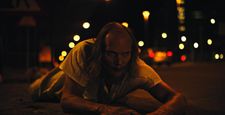 |
| Coming down to Earth |
“So that's why I started a four year project, which I'm still doing now, to make experimental films. So you know, I don't have to answer to anybody, I can just do what I want It’s just funny that it turns out the first experimental was Barry. After I shot the short, we had 60 official selections around the world, we picked up about 30 awards. And then on top of that, we started to get all this fan mail, which is a very random because it's a short film. People really just wanted more, but even back then, I didn't think about making it into a feature. I just looked at it as ‘that was a successful project’. And that was it.”
He then became seriously ill, he explains, detailing a serious of life changing experiences that left him exhausted. Even though he recovered from potentially fatal ailments, he found himself struggling with depression.
“I hit rock bottom. You know, it was it was a thing where I said to myself, you know what, what is the number one thing I've always wanted to do in life? And it was to to make a film, and I knew that was kind of like my medicine, to take my focus off the depression and everything. And I have all these other scripts that I could have done, that probably would have been way easier to shoot than Fried Berry, and, you know, I wanted to do something really creative. And then when I got the idea, and I thought, okay, but I'm going to make both.
“So I knew the story, I knew where it had to go, and how I was going to do it. And it had to be the perfect story, the perfect character to be able to do the film because Gary Green, who plays Barry, he's not a trained actor. So I had to build the movie around him to actually make it work. So whenever I got my producer, who I had already worked with for about two months, and I said to him, ‘Listen, I want to make a movie, I want to make it next month.’ And he was like, ‘Why do you want to make it next month?’ I was like, ‘Because I know if we don't, if I don't shoot it next month, it's never, ever going to happen.’ And where I was at the time with depression, I'm like, ‘I need to do it.’ And he was like, ‘Why haven't you got a script?’
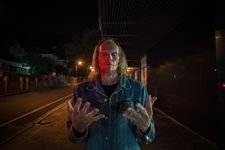 |
| An out of body experience |
“I explained about Gary and how to do it. And then a month later, we started shooting and we shot 28 days, over a year and a half. The movie progressed as we went. So they were still very much planned. And very much a lot of pre production went into it because at least we could plan, plan. plan. Apart from the dialogue and stuff that I wrote, I just improvised a workshop of the day on set with the other actors. So the only guy that didn't improvise was Gary. As I said, He's not a trained actor. So a lot of the time, you know, I was saying to Gary, ‘Don't do anything. Unless I tell you to, you do only this or you do that. Don't improvise.’
“Gary is a strange character. He's a very nice guy, he’s just a strange character. So ‘Just, like, don't do anything unless I say to. And then there were lots of times where, you know, I was like, ‘Copy my face.’ So I could always have reactions for the edits. And that's why the movie works, because the way I shot the movie works, because I based the movie around him, and that character was perfect. Even when he does speak, when he mimics even if it doesn't sound right, it's okay, it's fine. He's an alien.”
It’s an extraordinary performance to watch – perhaps because the character is an alien exploring how a human body works and Gary is going through a similar experience as an actor.
“It was just a crazy process, because I've worked with Gary now for about 11 years. So I know what he's capable of. His background is as an extra. But, you know, he also needs to learn how to do dialogue and deliver it, you know, delivering lines and stuff like that... I needed that clean slate every single day where he didn't know what he was going to do until he was actually doing it.”
And there’s that freshness, because the character is discovering things for the first time as well.
“Exactly... A lot of the time, it's about Barry’s experience in the world, and what the people that he meets experience. And so there's that flip side, every time you meet somebody. It's like we're going on the journey with Gary, you know, with Fried Barry, and other people are also experiencing Fried Barry, you know, together. So it's his experience, and it's their experience with him as this is this journey goes along.
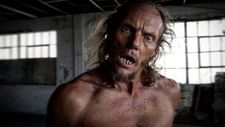 |
| A strange place to be |
“I wanted the audience to either go on the trip with Barry, as Barry, or go along for the ride with him. And it's also designed to make the audience feel uncomfortable. So this film is like, it's one thing happened after the next and I tried to make it so unpredictable, that there's no, you know, you can’t go, ‘I'm just going to go grab a drink,’ because you'll come back and you'll be like, ‘Well, how the hell did he get here? What? What's happening?’
“So there was a lot of planning that went into that, you know, to to make the audience feel feel that way to go on that to go on that journey. And as I said that, you know, the movie is also designed for at the end of the movie, that you just feel dead. You want to take a shower, afterwards.
“A lot of the movies that we watch these days, it's like, either this is going to happen or this, it's normally one of the two. So I want to eliminate that and be like, ‘You have no idea where where this movie is going to go.’”
I like it as a tour of Cape Town, I say, because it’s not the sort of thing a tourist board would approve of but it has lots of personality.
“Yes, so in South Africa, we have our own industry here, but it's small. It's getting bigger, but we're more of a service country. So we have, we're the biggest place in the world in Cape Town for commercials, a lot of overseas people come here to shoot because we have all these locations. So a lot of series of commercials shoot here because we've got a place that looks like Arizona, or we've got a place that looks like Mexico.
“Cape Town is a very beautiful place to look at. It's a very, very beautiful place. So I want to showcase it in a completely different way, how it's never been seen before on film, because normally, people always make it look beautiful. I wanted to do the dark side of Cape Town and I wanted to create my own little world. And I wanted to just create that grimness. Because I think no matter where you are in the world, these places exist. Every single city in the world has its dodgy areas, you know, there's certain areas that after a certain time, you don't really want to be walking down the roads, you know? Obviously, it's a bit more enhanced. I like Cape Town. I wouldn't be living here otherwise. I'm from Liverpool originally, but I've lived here for 11 years. So I'm a Scouse African.
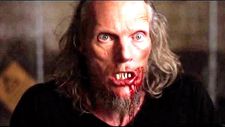 |
| Discovering human frailties |
“I really just wanted to show a different side of Cape Town, and have that like dark side to it, that grittiness.”
We discuss the practicalities of shooting.
“We don't want to shoot like one o'clock to three o'clock because the sun is too sharp, you know, it's too bright,” he says. “So it's picking the right time to film. We were very lucky in that we had a great crew.
“Fried Barry is definitely the first film of its kind to come out of South Africa. We don't make any movies like this whatsoever, like South Africa is really pretty conservative. So it's completely out of the norm. Nobody would like put money into a movie like this. And it's one of those things where you’ve got to know your audience. I knew what my audience would be. And I knew that they would love it. And I knew that with this type of thing it's either you love it or you hate it. There's no in between. And that's okay. I know with this type of film, the lovers will love it. The haters will hate it. But the great thing about it is that the haters will talk about it
“Everything so far has been absolutely amazing. There's been a lot of people that said ‘This is definitely going to be a cult movie classic, and it's a masterpiece.’ It's been amazing. And it's great that this is my first movie. Sadly, it took me, you know... I've come close so many times over the years to make a movie, and then the funding just fades away. It's one of those things where it was just the right time to do it. And that very horrible, hard time I went through, it brought the fire. Like it literally took me to nearly die to realise, ‘What am I doing? I've got to make this movie!’ So in a weird way. I'm grateful for going through that time to wake myself up more.”
I ask if the process of making the film helped him to recover from depression.
“Barry really saved me,” he responds. “I mean literally it has saved my life in so many ways. It got me out of the depression, my producer – that I worked with me for a month and a half beforehand – and I became very good friends, best friends. So I gained my movie and a best friend, which is also what I needed at the time. And I got to do the number one thing that I've always wanted to do in my life and I had 100% control... So it really was medicine for me and made me better and got me out of that horrible, horrible, horrible, horrible place that I was in. You know, people always say there's always that special feeling for your first one. I think with everything I went through, it's just so much more, you know? Blood, sweat, tears, depression, and everything is all gone, drawn into this movie”
Is that what he plans to do with the rest of his life now – to make more films?
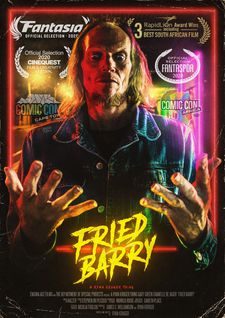 |
| Fried Barry poster |
“I've always wanted to shoot features. It's one of those things where, you know, I started doing short films that went into music videos, I did some commercials, it was always a jump in platform to make features but the question is like ‘When? When are you going to evolve?’ With my music videos, I was known for my visual narrative storytelling. So it was just the right move. And it was it's also one of those things where if you don't start saying no to music videos or commercials, you're just going to keep doing them. So you have to say ‘No, right, I'm not going to do that anymore. I'm going to have to put all my eggs in one basket and shoot for that. That's what I did. That's the only way to do it.”
So how's it going down in South Africa?
“This is the interesting thing,” he says. “So in March, we had played at the RapidLion in Johannesburg, where we got five nominations, won three awards. Best South African film, which was very shocking. Whoever made that decision, good for them! Because if we don't start making different films, that we're always going to keep making the same shit all the time. And I think South Africa wants different styles of genre movies.
“There is a buzz here about it. There's a lot of people that want to still check it out and still see it. And it's important for me, for the industry in South Africa, as it's a game changer for South Africa. So it's good for me, and for those people who see this movie, and to show people that we can make different movies here are not just, you know, historic stuff, whether it's apartheid movies or history of South Africa, you know, there's a lot more films to make than just the same stuff that they normally make here. And people want to see different stuff.
“I think Fried Barry will also create a wave where producers will go, ‘It is a bankable movie to make,’ you know? It has its audience. If you know your audience then you’re fine. But for me, the last place that I'm thinking about selling is actually South Africa.”
So with that in mind, does he have anything to say to the people who'll be watching it at Grimmfest?
“Yeah, I mean if you like we the crazy movies then this is available to watch, and I hope you enjoy it. And I think Fried Barry being at Grimmfest is great, I think the people will love it. You know, I think the horror audiences, they're intelligent people, I think they're more intelligent than other audiences. They get stuff and they're open minded.
“I think the people that watch it, I think you guys will know, we had a lot of fun. We had so much fun making this movie that we laughed every single day. We couldn't stop laughing. Literally every day was a funny day and we always had time to to joke. Yeah, it was just it was just a great, great experience.”





















